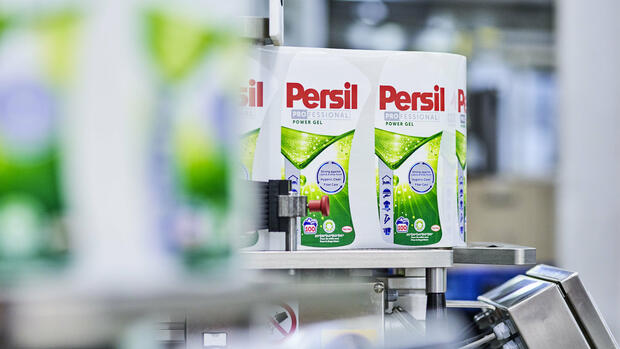Shareholders criticize the weak development of the group.
(Photo: Bloomberg)
Dusseldorf Henkel boss Carsten Knobel felt the criticism of the shareholders personally for the first time. The Düsseldorf-based company held its annual general meeting again on Monday after the restrictions imposed by the pandemic. Knobel only experienced the first three meetings as CEO of the Persil manufacturer virtually.
Henkel looks back on difficult months. The net profit collapsed by a quarter to 1.3 billion euros, the manufacturer sold fewer products and only increased sales thanks to price increases. Despite the high costs, competitors achieve significantly higher profit margins. The share price has risen recently, but at around EUR 74 it is far from the all-time high of EUR 130 from summer 2017.
Knobel has merged the ailing cosmetics business (Dial, Syoss) with the detergents and cleaning agents business and the well-known brands Persil and Pril. This causes internal unrest, as 2,000 jobs will be cut in the course of this. A further reduction in staff has been announced.
Apparently there was also unrest on the board. According to Handelsblatt research, Adhesives Board Member Jan-Dirk Auris had to leave the company in winter because of a power struggle with CEO Knobel. There was also uncertainty because Henkel worked for a year to withdraw from the Russian market.
>> Read more: Dispute escalated in the Henkel Management Board – Jan-Dirk Auris has to go now
Investor representatives criticized Henkel’s weak profitability. “Do we have to worry?” asked Jella Benner-Heinacher from the German Association for the Protection of Securities (DSW). Henkel is now in the headlines more often than before. “One has the feeling that there is a spanner in the works.” Alexander Elsmann from the Protection Association of Investors said: “Henkel is struggling with home-grown problems.”
Losses from the withdrawal from Russia
With a view to the withdrawal from Russia, Elsmann also asked the question: “Are we giving away something that we may regret later?” Other companies would continue to do business there.
Henkel announced on Thursday that it had signed a sales agreement. The sale has now been implemented. A consortium of Russian financial investors bought the business for the equivalent of 600 million euros.
>> Read more: These investors buy the Russian business for 600 million euros
Before the outbreak of war, Henkel generated five percent of its sales in Russia, a good one billion euros. No other Dax group had such a high share. For Henkel, Russia was the fourth most important market, which is now gone. The group announced in April 2022 after great public pressure that it would withdraw.
Henkel boss Knobel defended the withdrawal. “In view of the ongoing war, the tightening of sanctions and the geopolitical changes, it was and is the right decision. Also in the interests of our shareholders.”
Financially, however, the sale was not worthwhile. CFO Marco Swoboda also expects a “financial loss” due to the weak ruble exchange rate, details would be presented when the half-year figures were presented in August.
Henkel has contractually secured a buyback option, Swoboda confirmed rumours. A buyback is “possible at the earliest in a few years”. Such an agreement is common practice and does not change anything about the clear exit. A corresponding license agreement is intended to prevent the loss of trademark rights.
Henkel promises growth – also from the China business
Meanwhile, Henkel boss Knobel defended the corporate restructuring against criticism from shareholders. This is the right step and creates the greatest value. You will see that in the years to come. “We will deliver,” says Knobel. This will also be reflected in the share price.
The CEO agreed with the investors on a positive first quarter. “We got off to a good start in 2023.” Unlike its recent competitor Beiersdorf, Henkel has not increased its forecast so far. Henkel will present current quarterly figures next Thursday.
The consumer goods group has invited to a face-to-face meeting.
(Photo: Henkel)
Henkel also continues to calculate with proceeds from the China business, confirmed Knobel when asked by shareholders. Because the country is not democratic either, there are public doubts as to whether companies should rely so heavily on China.
>> Read more: Eight graphics explain why Henkel is doing so badly
“We are currently not planning to fundamentally change our commitment,” said the top manager. It is important to be present where there is growth. China is one of Henkel’s three most important markets, where the group generates eight percent of its sales. But the development is being observed, explained Knobel.
Meanwhile, the shareholders appreciated the face-to-face event. Only twelve of the 40 Dax companies have invited to an on-site meeting again this year. However, it was not as crowded in the Düsseldorf Stadthalle as it was at the meetings before the pandemic.
More: Persil manufacturers are struggling with high costs – Henkel profits plummet by 23 percent.

